Gov. Kay Ivey signs law allowing employee exemptions for COVID-19 vaccines
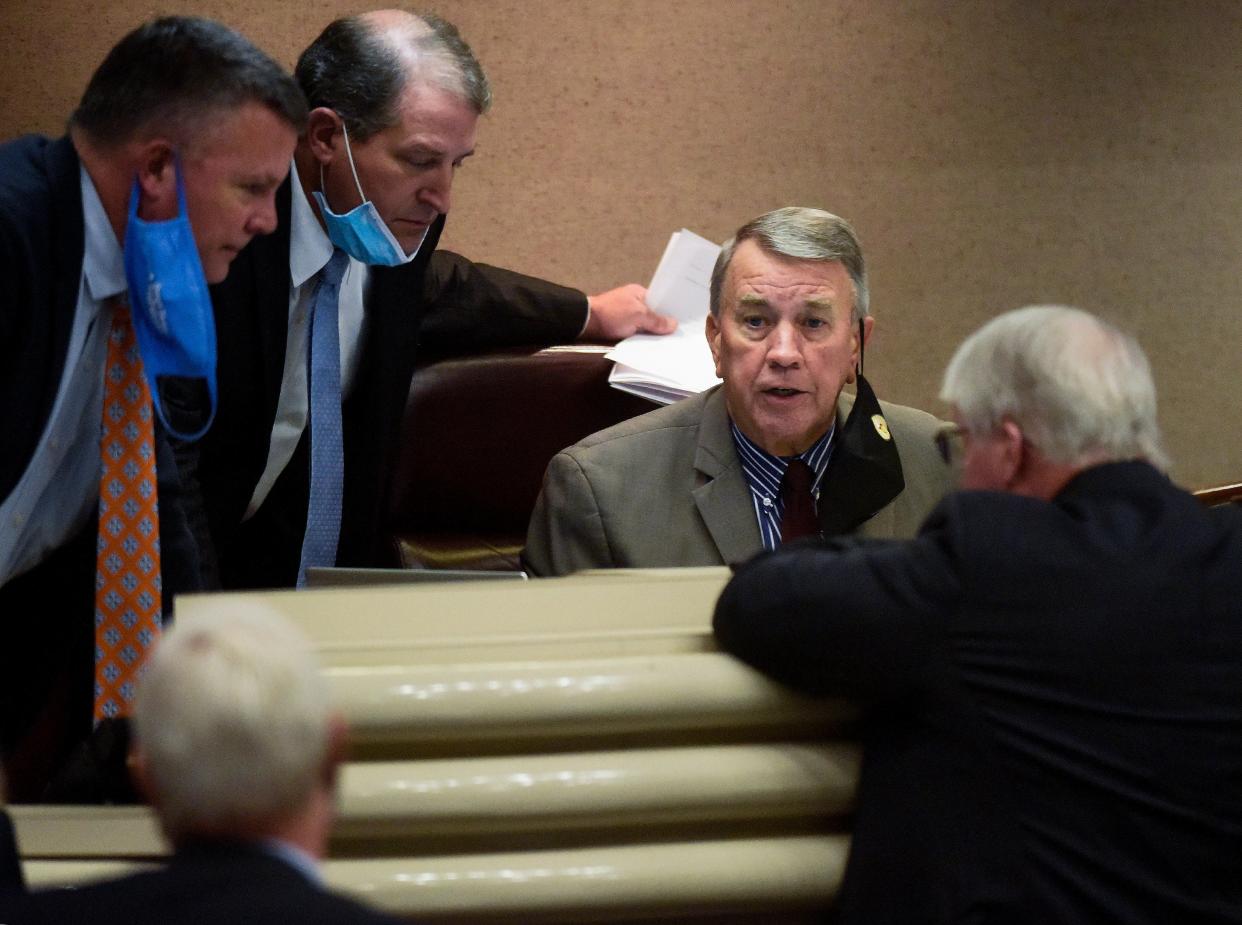
- Oops!Something went wrong.Please try again later.
Gov. Kay Ivey signed bills Friday that would require businesses to allow employees exemptions from the COVID-19 vaccine and allow the Alabama attorney general to enforce a law on parental consent for COVID-19 vaccines.
The bills, part of a broader GOP attack on a federal vaccine plan intended to prevent future surges of the disease, passed the Legislature on Thursday after hours of negotiations that often left legislators confused about what had been agreed to; after a House parliamentary procedure that left a key amendment off the passed bill, and near the end of a session that was intended to focus on redistricting.
More legislative action: Alabama Legislature works during redistricting special session
"How did we get to this point?" Rep. Laura Hall, D-Huntsville, asked Rep. Mike Jones, R-Andalusia, who handled the bill in the House.
"I often ask myself that question," Jones said. "But we’re here."
Vaccine status in business settings
Legislators also made major changes to SB 15, sponsored by Sen. Arthur Orr, R-Decatur. The legislation went into conference committee Thursday evening as legislation that would allow the attorney general of Alabama to seek injunctions against businesses or agencies that make vaccination status a requirement of services.
It came out with those provisions dropped, and instead authorized the attorney general to enforce provisions preventing minors from getting COVID vaccinations without parental consent, and preventing schools from asking about the COVID vaccination status of minors.
"Politics is a strange thing," Orr said at the start of a conference committee on the legislation.
Previously: Alabama COVID-19 vaccine exemption bill in position for final passage
The Senate approved the conference committee report on the parental consent bill on a 25 to 1 vote, and the exemption bill on a 23 to 2 vote. The House approved the parental consent bill on a 59 to 19 vote, and the exemption bill on a 75 to 27 vote.
Ivey said in a statement Friday that the bills were "another step in the fight" against the federal vaccine plan, which she called an "un-American, outrageous overreach."
"Alabamians – including those like myself who are pro-vaccine – are adamantly against this weaponization of the federal government, which is why we simply must fight this any way we know how," the statement said.
Exemptions for COVID-19 vaccines for employees
Most of the focus in the Legislature went to SB 9, sponsored by Sen. Chris Elliott, R-Fairhope. The bill would require employers to provide exemptions to COVID vaccinations for employees who claim religious or medical reasons for not taking the vaccine. Businesses would not be able to fire an employee for refusing to take the vaccine if the employee has filled out an exemption form.
"We are saying you cannot fire an employee based on their COVID-19 vaccination status," Elliott said during the debate.
The legislation applies to all businesses in Alabama, regardless of size, as well as health care providers.
By the numbers: Alabama COVID hospitalizations increased slightly last week, data shows
The bill put Republican legislators between two hard places: activists opposed to the Biden vaccine plan and fearful of losing their jobs for not being vaccinated, and business groups that have been a major component of the Alabama GOP coalition. The Business Council of Alabama (BCA) opposes Elliott's bill, saying it prevents employers from making choices about their workforces.
"This version continues to put employers and particularly federal contractors in a no-win situation between existing federal rules and conflicting proposed state laws," BCA said in a statement Thursday evening. "Non-compliance with the federal mandate could result in the loss of current and future contracts and jobs for their companies and communities."
Democrats criticized the legislation as anti-business and potentially harmful to the population.
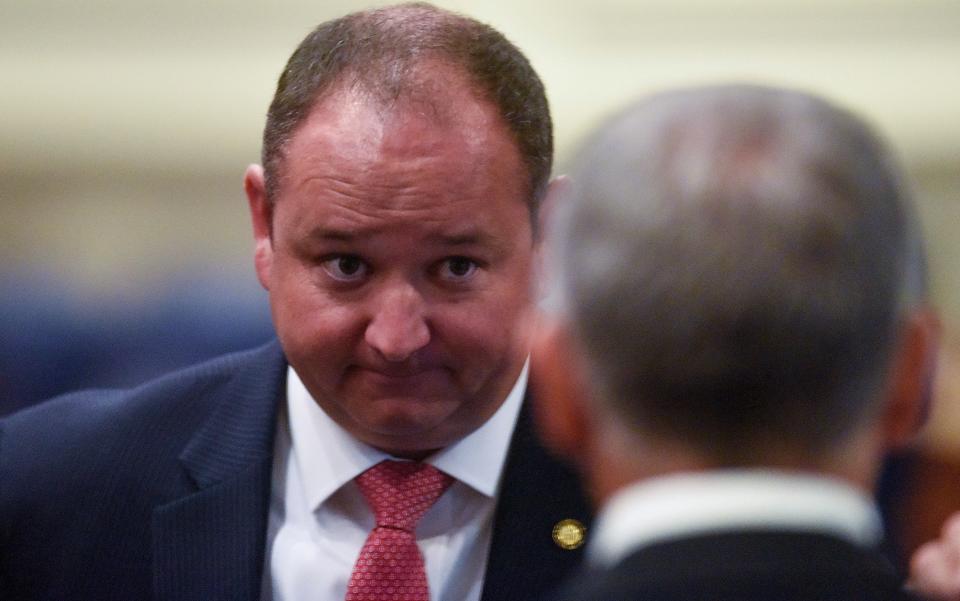
A long day and calls for job protection, increased vigilance alike
The conflicts led to a legislative day measured by lurches. Republican leaders held two lengthy recesses after coming in after 10 a.m. to work through issues with the legislation. A 90-minute House GOP caucus meeting broke up early Thursday morning with most members saying they were uncertain about what was coming. The House then took another long recess to discuss changes to the legislation.
Elliott said Thursday evening the major issues surrounded Alabama's at-will employment status. A bill preventing employers from firing unvaccinated employees would represent a significant departure.
"This is a place where the Republican legislature is understandably uncomfortable trying to work within employment law and the exception for that within the Biden mandate, to try to provide at least some temporary relief for employees," Elliott said.
Lawsuit: Alabama Gov. Kay Ivey joins lawsuit against Biden vaccine plan
The final bill, handled by Jones in the House, would require a licensed health care provider to sign off on a broad medical exemption option on the form, but not for those who claim specific reasons, including allergic reactions to vaccines; bleeding disorders; monoclonal antibody treatment, and those who are immunocompromised. Later changes to the bill gave employees seven days to appeal an adverse ruling, and require the law to expire on May 1, 2023.
Jones' bill also made it clear that employers could still fire an exempt employee for any other reason besides their COVID vaccination status.
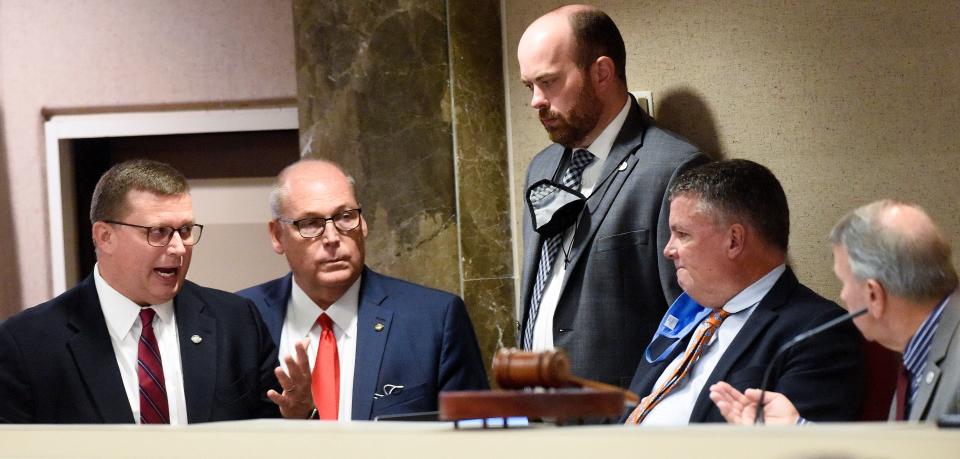
"This is a job protection type of bill," Jones said. "It’s to protect individual employees, to protect their jobs."
Rep. Louise Alexander, D-Bessemer, said she had attended many funerals of people who had died from COVID, and knew families that had lost up to six members from COVID.
"This is something we should not play with," she said.
Alabama has one of the lowest COVID vaccination rates in the country. According to the Centers for Disease Control and prevention, about 54.7% of Alabamians over age 12 have gotten one COVID-19 dose, while 45% have been fully vaccinated. Nationally, 67% of Americans have gotten at least one shot, and 58% have been fully vaccinated.
The low vaccination rate was a major contributor to a summer surge in COVID-19 cases that strained Alabama's intensive care units and led to federal teams being deployed to hospitals in south Alabama to help with the workload.
The Alabama Department of Public Health said as of Thursday that 15,734 people have died in Alabama during the pandemic. The majority of those deaths — 8,545 (54%) — occurred this year, at a time when the vaccine was widely available.
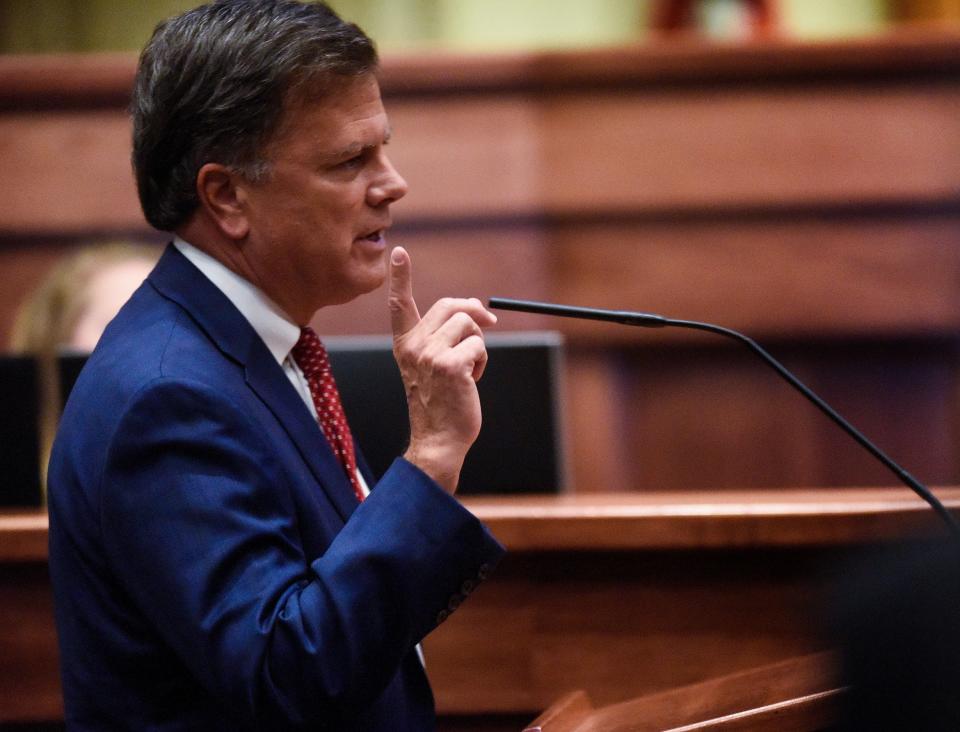
"Alabamians are asking for a choice," said Senate Majority Leader Greg Reed, R-Jasper, "They've asked for the opportunity to make their own decisions, and we feel like we need to support them in that."
President Biden's vaccine plan trickles down — or not
The Biden vaccine plan would require businesses with more than 100 employees to have workers vaccinated or submit to regular tests. It would also require federal contractors to vaccinate all their workers. The University of Alabama and Auburn University, both of which are considered federal contractors, are requiring their employees to get vaccinated.
The White House has cited the success of private businesses with mandates, such as Tyson Foods, in driving up vaccination rates.
Alabama Republicans have joined a broader GOP attack on the vaccine plan, saying the proposal amounts to federal overreach. Alabama Gov. Kay Ivey signed an executive order last week prohibiting state agencies from cooperating with the plan, though the impact of that is not clear. Ivey and Alabama Attorney General Steve Marshall have joined a multi-state lawsuit against Biden's proposal.
Jones, who has received the vaccine, said he believed there was confusion about it.
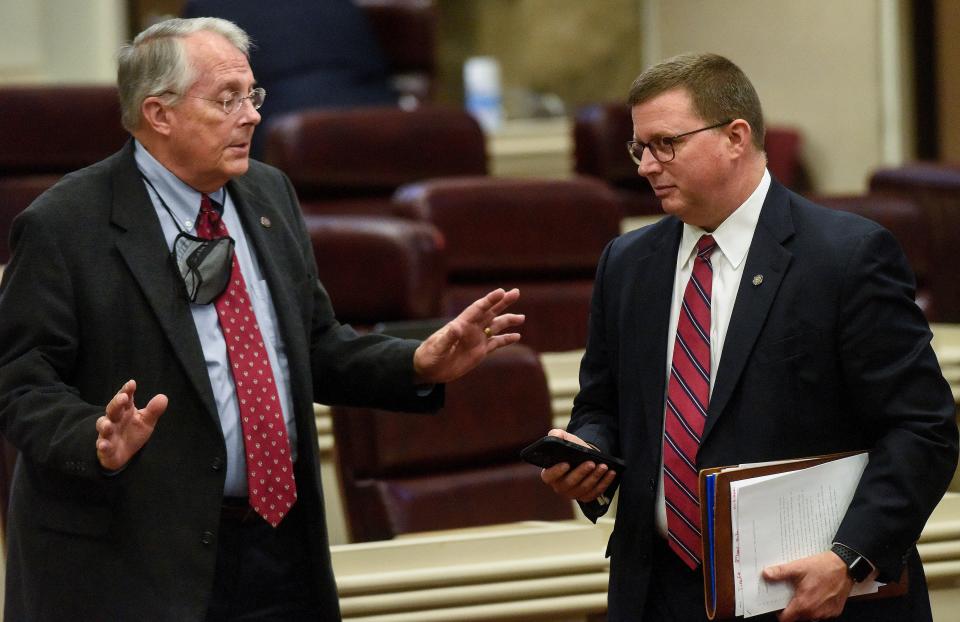
"They are truly afraid of the vaccine," he said. "They are fearful of it. I don’t take it for granted. I believe their choice is based on their fear."
Rep. Thomas Jackson, D-Thomasville, was skeptical of the assertion that the state plan would protect jobs.
"Isn’t that what the (federal) mandate does, protecting jobs?" Jackson says. "People don’t get sick? Jobs stay open?"
House Minority Leader Anthony Daniels, D-Huntsville, said the bill would create "red tape" for employers and potentially lead to job losses, particularly for federal contractors in his district.
"This is a job killer," he said. "I am sick and tired of this. This right here is really going to cause a lot of problems for all of us."
Republicans in the House clotured debate over the bill prior to Rep. Prince Chestnut, D-Selma, offering what members said was an agreed-upon amendment adding causes of action to the bill. The change had to go into the bill in the conference committee.
Who voted for what
A full list of the Senate votes on the parental consent bill bill was not immediately available on Thursday evening.
In the Montgomery County Senate delegation, Sen. Will Barfoot, R-Pike Road, voted for the conference committee reports on the exemption bill. Sen. Kirk Hatcher, D-Montgomery, was not listed as voting.
In the House delegation, Reps. Reed Ingram, R-Pike Road, and Chris Sells, R-Greenville, voted for the report on the parental consent bill; Reps. Kelvin Lawrence, D-Hayneville, and Tashina Morris, D-Montgomery, voted against it. Reps. Kenyatte Hassel, D-Montgomery and Charlotte Meadows, R-Montgomery, were not listed as voting. On the exemption bill -- in which Democrats did not invoke a rule requiring members to vote their own machines -- Ingram, Meadows and Sells were listed as voting for the conference report; Hassell, Lawrence and Morris were listed as voting against.
In the Autauga and Elmore county delegations, Sen. Clyde Chambliss, R-Prattville, and Reps. Will Dismukes, R-Prattville, and Mike Holmes, R-Wetumpka, voted for the exemption bill. Dismukes and Holmes voted for the parental consent bill.
In the Tuscaloosa County Senate delegation, Sens. Gerald Allen, R-Tuscaloosa, and Senate Majority Leader Greg Reed, R-Jasper, voted for the exemption bill . Senate Minority Leader Bobby Singleton, D-Greenboro, voted against it.
In the Tuscaloosa County House delegation, Reps. Cynthia Almond, R-Tuscaloosa; Kyle South, R-Fayette, and Rich Wingo, R-Tuscaloosa, voted for the conference committee report on the parental consent bill; Rep. Chris England, D-Tuscaloosa, voted against it. Reps. A.J. McCampbell, D-Linden, and Rodney Sullivan, R-Northport, were not listed as voting. On the exemption bill -- in which Democrats did not invoke a rule requiring members to vote their own machines -- Almond; South, Sullivan and Wingo were listed as voting for it, and England and McCampbell were listed as voting against it.
In the Etowah County delegation, Sen. Andrew Jones, R-Centre and Reps. Gil Isbell, R-Gadsden, and Craig Lipscomb, R-Rainbow City, voted for the conference committee reports on employee exemptions. Isbell and Lipscomb voted for the parental consent bills.
Contact Montgomery Advertiser reporter Brian Lyman at 334-240-0185 or blyman@gannett.com.
This article originally appeared on Montgomery Advertiser: Ivey signs law allowing employee exemptions for COVID-19 vaccines

